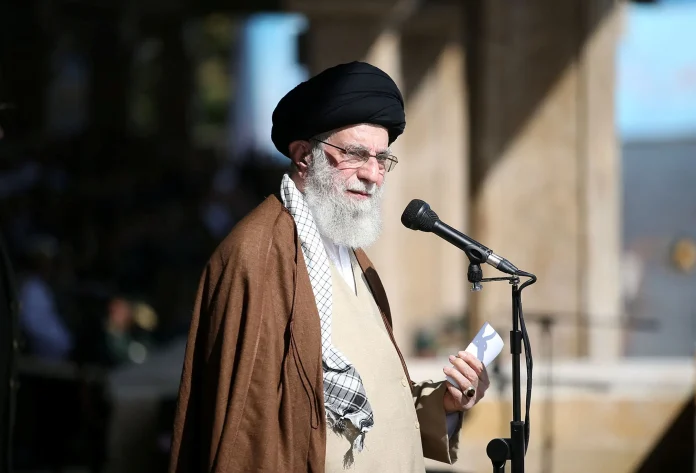On June 26, 2025, Iran’s Supreme Leader Ayatollah Ali Khamenei emerged from hiding to deliver his first public statement since a fragile ceasefire ended the 12-day Iran-Israel war.
In a televised address, Khamenei declared a “victory” over Israel and claimed Iran had “delivered a hand slap to America’s face,” referring to retaliatory missile strikes on a U.S. base in Qatar.
The remarks, made after U.S. and Israeli airstrikes targeted Iran’s nuclear facilities, have reignited global tensions and debates about the region’s future.
Khamenei’s defiant tone, coupled with his warnings of further retaliation, underscores the precarious nature of the ceasefire and raises questions about Iran’s next moves.
This article explores Khamenei’s statement, the context of the conflict, and its implications for global security, oil markets, and social media discourse, ensuring its relevance for ongoing discussions.
Main Points
- Khamenei’s Victory Claim: In his first public appearance since June 19, 2025, Khamenei declared Iran’s victory over Israel and the U.S., citing a missile strike on a U.S. base in Qatar.
- Ceasefire Context: The ceasefire, brokered by U.S. President Donald Trump and Qatar, began on June 24, 2025, after U.S. strikes on Iran’s nuclear sites and Israel’s attacks starting June 13.
- Nuclear Program Damage: U.S. strikes hit Fordow, Natanz, and Isfahan, with conflicting reports on the extent of damage to Iran’s nuclear capabilities.
- Retaliatory Threats: Khamenei warned that the U.S. would “pay a heavy price” for further attacks, hinting at Iran’s capacity to target U.S. regional assets.
- Global and Social Media Reactions: World leaders urge de-escalation, while X posts reflect polarized sentiments, with some praising Khamenei’s defiance and others questioning his claims.
The Iran-Israel Conflict: A 12-Day War
The conflict began on June 13, 2025, when Israel launched “Operation Rising Lion,” targeting Iran’s nuclear facilities and assassinating key military and scientific figures, including Ali Shamkhani and nuclear scientists Fereydoon Abbasi and Mohammad Tehranchi.
Iran responded with “Operation True Promise III,” firing ballistic missiles and drones at Israeli targets, including a hospital and Haifa’s oil refinery.
On June 22, the U.S. joined the fray, striking Iran’s nuclear sites with bunker-buster bombs in “Operation Midnight Hammer,” prompting Iran’s missile attack on Al Udeid Air Base in Qatar on June 24.
The ceasefire, announced by Trump on Truth Social, took effect within six hours, halting hostilities after 12 days.
However, both sides violated the ceasefire’s early hours, with Trump expressing frustration over continued exchanges. Khamenei, absent from public view since June 13, had been sheltering in a bunker, communicating through a trusted aide to avoid assassination attempts by Israel, which Prime Minister Benjamin Netanyahu did not rule out.
Khamenei’s Statement: Defiance Amid Destruction
In his June 26 address, broadcast on Iranian state television, the 86-year-old Khamenei appeared fatigued but resolute, speaking against a backdrop of plain brown curtains.
He claimed Iran’s “victory” over Israel, asserting that the U.S. intervened to save the “Zionist regime” but “achieved no gains.”
Referencing Iran’s missile strike on Al Udeid, which caused no casualties, he boasted that Iran had “delivered a harsh slap to America’s face” and warned that such actions could be repeated.
Khamenei’s rhetoric emphasized Iran’s resilience, stating, “A nation of around 90 million stood united, with one voice, supporting the armed forces.” He rejected Trump’s earlier demand for “unconditional surrender,” asserting that Iran’s history and character preclude submission.
Despite claims of victory, reports suggest Iran’s nuclear sites were “badly damaged,” though Khamenei insisted they remain unaffected.
This contradiction has fueled skepticism, with analysts like Haviv Rettig Gur questioning the strikes’ success.
Geopolitical Implications
Regional Tensions
Khamenei’s statement has heightened fears of renewed conflict. Iran’s threats to target U.S. assets and block the Strait of Hormuz, a critical oil route, could disrupt 20% of global oil supply, pushing prices toward $130 per barrel.
The ceasefire’s fragility is evident, with Iran’s Foreign Minister Abbas Araghchi denying a formal agreement and refusing talks until Israel halts attacks.
Diplomatic efforts in Geneva, involving European and Iranian officials, aim to de-escalate, but progress remains uncertain.
Global Reactions
Allies like the UK and Australia cautiously supported the U.S. strikes but urged diplomacy, while Russia’s Vladimir Putin offered mediation.
The UN condemned the strikes as violations of international law, and Gulf states expressed concern over regional instability. Social media, particularly X, reflects polarized sentiments.
Posts like those from @Maks_NAFO_FELLA highlight Khamenei’s claim of undamaged nuclear sites, while @AmitSegal questions his credibility, asking, “Does he believe himself?”
Succession Concerns
Khamenei’s absence during the war and reports of him naming three potential successors—excluding his son Mojtaba—signal internal vulnerabilities.
The Assembly of Experts has been instructed to expedite the process, with Hassan Khomeini, grandson of Ayatollah Ruhollah Khomeini, emerging as a reformist candidate.
This move, prompted by assassination fears, underscores the regime’s precarious state, with analysts like Lina Khatib predicting Khamenei may be Iran’s last “Supreme Leader” in the traditional sense.
Economic and Social Impact
The war’s economic toll is significant. Oil prices surged 4% to $78.83 per barrel for Brent crude, with fears of further spikes if tensions escalate.
Iran’s economy, already strained by sanctions, faces further challenges, with markets nearly empty and citizens grappling with destruction. Domestically, Khamenei’s regime has cracked down on dissent, imposing internet restrictions and banning public filming to control narratives.
Many Iranians, while defending their nation, harbor resentment toward the regime’s ideological pursuit of Israel’s destruction, viewing it as a costly misstep.
Why This Story Stays Relevant
Khamenei’s statement transcends the immediate ceasefire, tapping into enduring global concerns:
- Nuclear Ambitions: Iran’s nuclear program remains a flashpoint, with debates over its recovery timeline fueling international scrutiny.
- U.S.-Iran Rivalry: The “hand slap” rhetoric and threats against U.S. bases keep the U.S.-Iran conflict in the spotlight, relevant to discussions on global power dynamics.
- Social Media Amplification: X posts, like those from @AJEnglish and @RT_India_news, amplify Khamenei’s defiance, ensuring the story trends as users debate Iran’s resilience versus its vulnerabilities.
- Leadership Transition: Speculation about Khamenei’s successors and Iran’s future governance adds a layer of intrigue, keeping the story alive in geopolitical circles.
- Oil and Economic Stability: The threat to the Strait of Hormuz ties the conflict to global economic concerns, making it a perennial topic for energy markets.
Challenges and Criticisms
Khamenei’s victory claims face skepticism due to conflicting reports about the strikes’ impact. The CIA asserts Iran’s nuclear facilities were “severely damaged,” requiring years to rebuild, while Khamenei insists they remain operational.
His absence during the war and reliance on a trusted aide have raised questions about his control, with some Iranians blaming him for leading the country into ruin.
Critics argue his focus on ideological battles over Israel and the U.S. prioritizes regime survival over national welfare, a sentiment echoed on X.
Ayatollah Ali Khamenei’s first public statement since the Iran-Israel ceasefire on June 26, 2025, has reignited global debates about Iran’s role in the Middle East and its defiance against the U.S. and Israel.
By claiming victory and warning of further retaliation, Khamenei seeks to project strength, but the war’s toll—damaged nuclear sites, economic strain, and internal dissent—reveals vulnerabilities.
The ceasefire’s fragility, coupled with succession plans and economic concerns, ensures this story’s relevance beyond the immediate news cycle.
As the world watches Iran’s next moves, Khamenei’s address serves as a reminder of the delicate balance between defiance and diplomacy in a volatile region.

